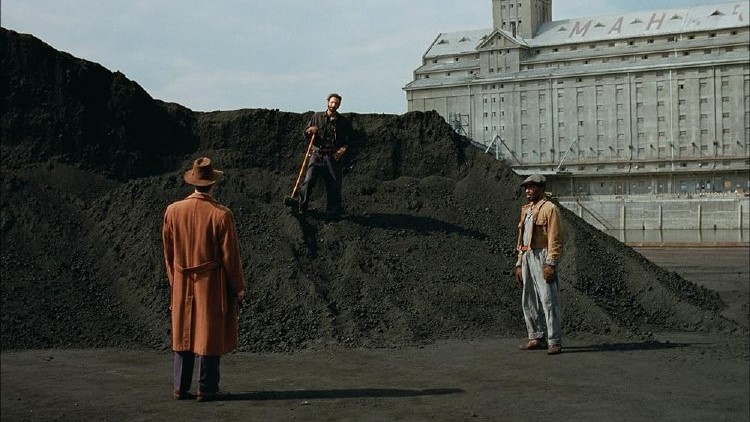The Brutalist

Separated from his beloved wife Erzsébet (Felicity Jones) by the Holocaust, Jewish Hungarian architect László Tóth (Adrien Brody) is welcomed into the U.S. by his cousin Attila (Alessandro Nivola) who gives him a job in he and his wife Catholic wife Audrey's (Emma Laird) furniture store. László secures a massive custom job from Harry Lee (Joe Alwyn), who wishes to surprise his industrialist father Harrison Lee Van Buren Sr. (Guy Pearce) for his birthday. At first Harrison balks against the modernist marvel Tóth creates for his library, but then realizes its genius and hires the man to create a massive multi-purpose community building that will brand Tóth as "The Brutalist."
Laura's Review: A-
Cowriter (with wife Mona Fastvold)/director Brady Corbet ("Childhood of a Leader," "Vox Lux") began his filmmaking career with the forming of a future fascist authoritarian in the child of an American diplomat stationed in France after WWI, then drew a portrait of a school shooting survivor who finds catharsis through song, then casts future national tragedy, including 9/11, through her eyes as a rock star. With his third film, Corbet has created an American epic revealing the dark and twisted underbelly of the American dream as seen through the eyes of an immigrant. "The Brutalist," which refers to an architectural style of cold, concrete minimalism and harsh angles, pits an artistic dreamer against power and wealth, but while the former is crushed and degraded by the latter, it is the artist who will be remembered.
We meet Tóth as his ship sails into New York, cinematographer Lol Crawley ("Vox Lux," "White Noise") within the crush of people racing to the deck to be welcomed by the Statue of Liberty, creating a joyous chaos (the film was shot in Vistavision, a high resolution widescreen format used in the 50's for such films as "White Christmas" and Hitchcock's "Vertigo" and "North by Northwest"where the film is run horizontally through the camera). The man who has endured the holocaust indulges in the city's seedier aspects, including a heroin addiction which he never quits, before heading to Pennsylvania, where it will be family, Attila's wife, who symbolizes the New Land's first rejection of him. But Tóth himself is empathetic to the needs of others, even at his lowest living in a homeless shelter where he witnesses a single black father (Isaach De Bankole, "The Limits of Control," "Black Panther") turned away from a bread line with nothing for his son and promises to be there first thing the next day to secure food for them both. A lifelong friendship is made, Gordon the first hired to help him build Van Buren's monument to his deceased mother.
The film runs three and a half hours, yet keeps its audience so rapt, the time flies by, much of that given to the frustrations of a massive construction project, Van Buren's financing pitted against Tóth's unrelenting vision, project manager Jim Simpson (Michael Epp) trying to please both. There is a work stoppage caused by a train derailment that appears to be the end, but Van Buren will seek the architect again, reigniting the project with a visit to
Carrara to choose marble, a trip that Van Buren will use to exert dominance with sexual humiliation, something that will be flung back in his face later by Tóth's wife, a condemnation which banishes him from the screen.
Her arrival around the film's midsection brings a period of peace to László, despite his shock at her condition, the Holocaust having brought on osteoporosis, landing her in a wheelchair, accompanied and cared for by her niece Zsófia (Raffey Cassidy, "White Noise"). Both of these women will also be impacted by this wealthy American family, Erzsébet courted like her husband only to be betrayed, Zsófia encountering Harry by a lake on the property in a scene implying much but telling little. (Interestingly, Harry's sister, Maggie Lee (Stacy Martin, "Nymphomaniac, Vol. 1"), will stand with Erzsébet against her family's men, who treat her brutally.) Erzsébet, too, will have disappeared like Van Buren, albeit less mysteriously, for the film's last scene, a flash forward after having found the couple living modestly in New York, Zsófia about to leave with a husband for Israel. It is now 1980 and Tóth's work is being honored at an exhibition in the Venice Biennale. Now it is László in the wheelchair and we finally learn just what inspired that great, brutalist block upon Van Buren's hill.
Brody hasn't had a role this monumental since his Oscar winning turn in "The Pianist," but the revelation here just might be Jones who has never burned so brightly on the screen before. Both speak Hungarian, as well as applying the accent to their English, for the film. Pearce is all manipulative magnanimity, his cloak of extreme wealth hiding a malignant heart.
Corbet's magnum opus has the broad sweep of history, the cinematography offering the open roads and big skies of possibility, Daniel Blumberg's continually morphing score bringing us from the jazz of the early 50's to 1980's New Wave. "The Brutalist" is like a weighty novel you just can't put down.
Robin's Review: A-
A24 released "The Brutallist" in select theaters on 12/20/24, expanding into 2025.

